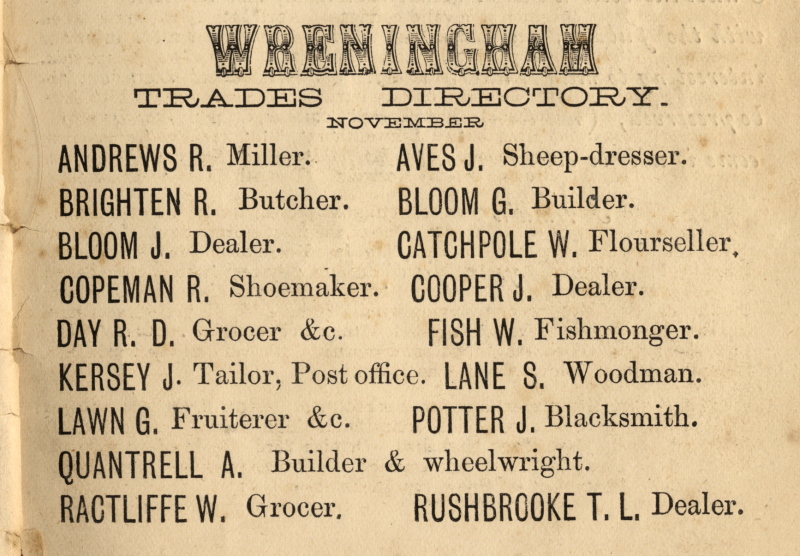William Fish – the Fishmonger

William Fish is shown middle right.
How come Wreningham had a fishmonger, in the late 1800s, when it was still quite a long journey to the nearest fishing port? … and was his surname “Fish” just a coincidence – or did he view it as some kind of “calling”!?
Well, we don’t know what kind of fish he sold. Were they sea fish or were they fresh-water? Did he sell both? Of course, whatever the type, keeping fish fresh has always been pararmount; there were no fridges or freezers in those days. The grounds of large houses sometimes contained special cold stores but none are known about for Wreningham. The railway was able to move some goods around quickly – and we did have a local train station. Whilst fishmongers are noted for selling fresh fish, we should not forget that cured, smoked and pickled fish have longer shelf lives and William might have traded those.
No doubt the proximity of Great Yarmouth and its hundreds of fishing boats, was helpful in providing a ready supply of sea fish. In the late 1800s there was also a thriving industry on the Norfolk Broads with “the best fresh-water fishing in the country”. They sent huge quantities of netted fresh-water fish to the Midlands. Obtaining small quanties of fresh-water fish for our local consumption might not have been difficult.
The truth is that William did not stay a fishmonger for his entire career – and only lived in Wreningham for about ten years. In 2018, the Hapton History Group (their website remains largely under construction) published a 60 page paper booklet about their village’s participants in the First World War. (William’s son, Bertie, was wounded, became a prisoner of war and died of his injuries, in Bulgaria, in 1916.) This Hapton booklet also includes William’s potted life story:
Born in Dickleborough, William Fish had married Mary Barrett in 1877; they began their married lives in Wreningham. Our own Highway Rates books show William being resident in Wreningham – and renting a cottage from John Bullimore between about 1884 and 1893. They moved to Hapton and, by 1901, were living in Flordon where William had become a farmer “with employees”. Sadly, William died in 1910 – still in his early 50s. His widow died in Essex, in 1934.
Wreningham shopkeeper, Robert Dennis Day’s, Account Customer ledger does not show him selling any fish to his Wreningham account customers. However, it does list him occasionally selling salmon and lobsters to Mary English, his relative, who ran the equivalent village shop in Forncett. The lobsters were mostly supplied in half dozen quanties although there was a single sale for one dozen “Atlantic Lobsters”.
Being a relative, R D Day always sold goods to Mary English “at cost” although the additional business probably benefitted his position with his own suppliers.
There is no reference to whether these lobsters were transported live – although moving around live lobsters might have been more interesting! We can only imagine Mary English pre-taking her own orders from people in the Forncett area who were about to enjoy a special occasion.
Perhaps the success of an initial “celebratory event” resulted in the subsequent business? On the other hand, lobsters and salmon might not have been seen as “special” to everyone.
